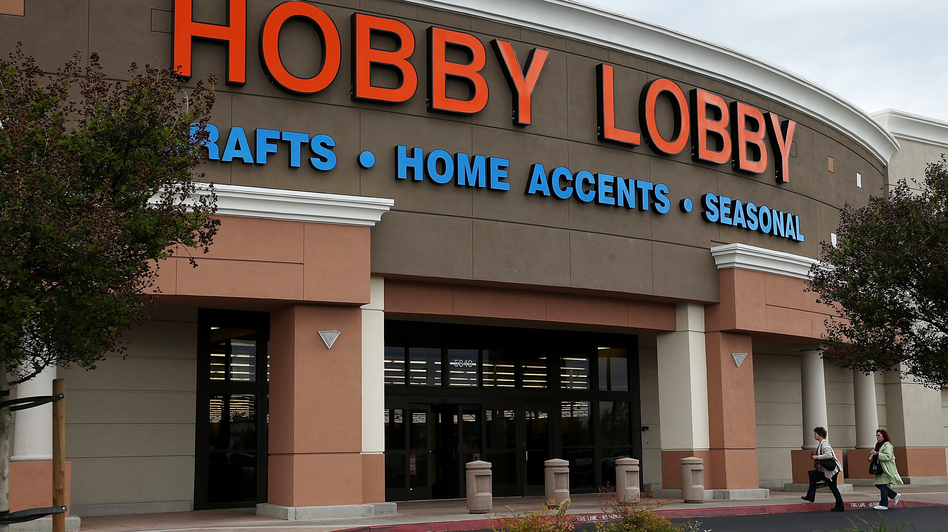
The Supreme Court has ruled that Hobby Lobby and other family owned and closely held for-profit companies can opt out of the Affordable Care Act’s provisions for no-cost prescription contraception in most health insurance plans. Hobby Lobby’s owners had objected on the grounds of religious freedom.
The ruling affirms a Hobby Lobby victory in a lower court and gives new standing to similar claims by other companies.
The justices announced their decision Monday morning. We’ll update this post as more information and analysis about the ruling emerge.
Update at 10:27 a.m. ET: Qualifications And Other Remedies
The court’s vote on the case was split 5-4. The majority opinion was written by Justice Samuel Alito. Voting against the majority were Justices Stephen Breyer, Elena Kagan, Ruth Bader Ginsburg and Sonia Sotomayor.
“The Court says that the government has failed to show that the mandate is the least restrictive means of advancing its interest in guaranteeing cost-free access to birth control,” reports SCOTUSBlog. The site adds:
“This decision concerns only the contraceptive mandate and should not be understood to mean that all insurance mandates, that is for blood transfusions or vaccinations, necessarily fail if they conflict with an employer’s religious beliefs.”
In a concurring opinion, Justice Anthony Kennedy writes that the federal government could choose to pay for contraception coverage, removing the companies from the equation.
Our original post continues:
The case, Burwell vs. Hobby Lobby, is perhaps the most important decision of the high court’s term, legal analysts say. Burwell, you’ll recall, is Sylvia Mathews Burwell, who became secretary of the Department of Health and Human Services early this month.
Here’s a quick summary of the issue from NPR’s Nina Totenberg:
“In enacting the ACA, Congress required large employers to provide basic preventive care for employees. That includes all birth control methods approved by the FDA. Under the law, religious nonprofits were exempted from this requirement, but for-profit corporations were not.
“The Hobby Lobby corporation, which has 500 stores and 16,000 employees, objects to some forms of birth control on religious grounds.
“But the government points to a long line of cases holding that for-profit companies may not use religion as a basis for failing to comply with generally applicable laws.”
Hobby Lobby and other companies that don’t want to cover contraception cited the Religious Freedom Restoration Act of 1993, which “provides that the government ‘shall not substantially burden a person’s exercise of religion’ unless that burden is the least restrictive means to further a compelling governmental interest,” says the overview of the case by SCOTUSBlog.
There are also financial considerations in play.
“Hobby Lobby owners contend that the ACA contraception mandate imposes a substantial burden on them because failure to comply results in big fines — $26 million a year for Hobby Lobby if it opts out of providing insurance altogether,” Nina reported in March. “Supporters of the mandate counter that $26 million may be a lot of money, but it is less than the company currently spends on insurance.”
Earlier this month, Julie Rovner ran down some of the specifics about the companies’ resistance.
Hobby Lobby is owned by the Green family, she said, who are evangelical Christians, “and the Hahn family that owns Pennsylvania cabinet-maker Conestoga Wood Specialties are Mennonites.”
While both companies already include many forms of birth control in their health plans, Julie reported, “The owners say they are opposed to some forms of birth control — particularly emergency contraceptives Plan B and Ella, which can be used to prevent pregnancy if taken within 24 hours to as much as five days after unprotected sex — because these contraceptives prevent a fertilized egg from implanting in a woman’s uterus.”
9(MDEwMjQ0ODM1MDEzNDk4MTEzNjU3NTRhYg004))
Read original article – Published June 30, 201410:19 AM ET
Closely Held Companies Can Refuse To Cover Contraception, Supreme Court Says
